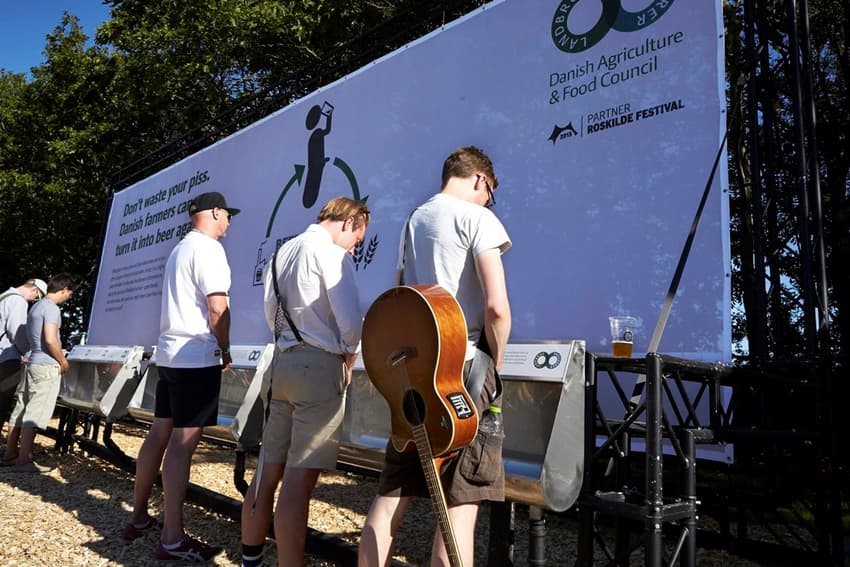Danish farmers brew beer from recycled festival guest urine

A beer brewed using urine collected from festival guests? It might sound like toilet humour, but that is exactly what Danish farmers have done.
There is, of course, no actual urine in the beer. The waste product is used as fertiliser in the brewing of the pilsner – in itself, a not-uncommon part of manufacturing processes.
But the new Danish beverage collects its fertiliser from humans at Roskilde Festival - the largest music festival in Northern Europe - and not from cows or pigs.
In 2015, the Danish Agriculture and Food Council (Landbrug & Fødevarer) collected 54,000 litres of urine from festival attendees at the Roskilde Festival. During spring 2016, the urine was used as fertiliser, yielding 11 tons of malting barley.
Now, the project - dubbed 'beercycling' - has almost come full circle with the completed production of the brew.
Beercycling English from Landbrug & Fødevarer on Vimeo.
The result, a pilsner beer called Pisner, will see the light of day in Denmark this summer.
“Just as we have seen shops sell goods that would otherwise have been thrown out, beercycling allows us to recycle a product that is normally flushed down the drain. When it comes to circular economy, Danish farmers are some of the best in the world. If you can brew a beer with urine as fertiliser, you can recycle almost anything,” said Karen Hækkerup, CEO of the Danish Agriculture and Food Council.
READ ALSO: How Roskilde's guests control waste while getting wasted
The Danish Agriculture and Food Council is collaborating with brewery Nørrebro Bryghus to brew 60,000 bottles of the Pisner beer.
“We want to be a part of the beercycling project partly due to the story it has already told, but also because it is interesting to partake in a project which addresses the challenges of sustainability and circular economy. Basically, it is a cool project,” Henrik Vang, executive director at Nørrebro Bryghus, said via a press release.
The brewing process started at the end of March and the public will be able to taste the finished product in June 2017.
Comments
See Also
There is, of course, no actual urine in the beer. The waste product is used as fertiliser in the brewing of the pilsner – in itself, a not-uncommon part of manufacturing processes.
But the new Danish beverage collects its fertiliser from humans at Roskilde Festival - the largest music festival in Northern Europe - and not from cows or pigs.
In 2015, the Danish Agriculture and Food Council (Landbrug & Fødevarer) collected 54,000 litres of urine from festival attendees at the Roskilde Festival. During spring 2016, the urine was used as fertiliser, yielding 11 tons of malting barley.
Now, the project - dubbed 'beercycling' - has almost come full circle with the completed production of the brew.
Beercycling English from Landbrug & Fødevarer on Vimeo.
The result, a pilsner beer called Pisner, will see the light of day in Denmark this summer.
“Just as we have seen shops sell goods that would otherwise have been thrown out, beercycling allows us to recycle a product that is normally flushed down the drain. When it comes to circular economy, Danish farmers are some of the best in the world. If you can brew a beer with urine as fertiliser, you can recycle almost anything,” said Karen Hækkerup, CEO of the Danish Agriculture and Food Council.
READ ALSO: How Roskilde's guests control waste while getting wasted
The Danish Agriculture and Food Council is collaborating with brewery Nørrebro Bryghus to brew 60,000 bottles of the Pisner beer.
“We want to be a part of the beercycling project partly due to the story it has already told, but also because it is interesting to partake in a project which addresses the challenges of sustainability and circular economy. Basically, it is a cool project,” Henrik Vang, executive director at Nørrebro Bryghus, said via a press release.
The brewing process started at the end of March and the public will be able to taste the finished product in June 2017.
Join the conversation in our comments section below. Share your own views and experience and if you have a question or suggestion for our journalists then email us at [email protected].
Please keep comments civil, constructive and on topic – and make sure to read our terms of use before getting involved.
Please log in here to leave a comment.